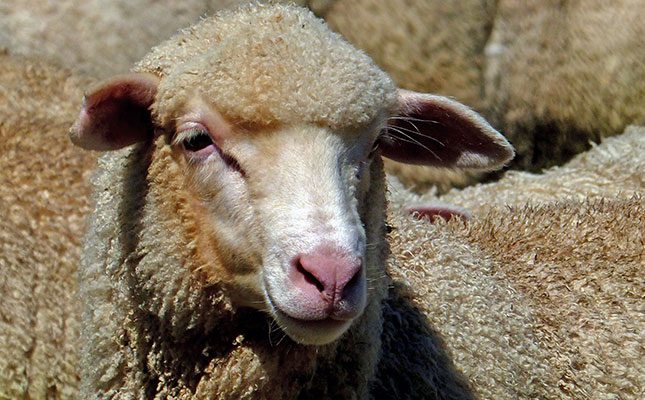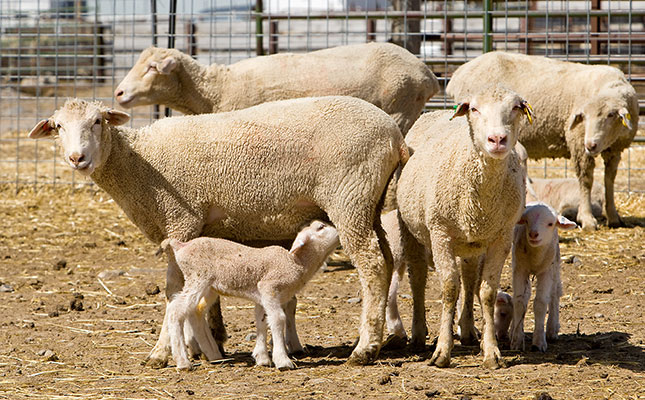
Photo: Flickr
Artificial insemination in sheep is used to improve reproduction efficiency, ensure continuous genetic improvement and practise disease control.
In addition, some stud farmers often provide buyers with semen from purchased rams as additional insurance.
READ Meat, milk or wool: choose a sheep breed fit for purpose
Ram semen can be collected using various techniques such as the use of an artificial vagina or electro-ejaculation.
Electro-ejaculation, a procedure that does not last longer than a few seconds, is an effective and practical method to collect semen from animals that are not able to mate or from untrained rams.
The semen sample collected is usually of good quality but recently concerns have been raised by retailers and consumers about animal welfare issues associated with electro-ejaculation.
Currently, in South Africa, electro-ejaculation is an approved procedure by most animal welfare organisations, but it is becoming increasingly controversial.
Electro-ejaculation is not regulated in South Africa yet, but some superficial provision is made in the Animal Protection Act (No. 71 of 1962) for unnecessary suffering of animals.
In addition, there has been a claim by the ‘Responsible Wool Standard’ Certification Scheme piloted by BKB that electro-ejaculation of rams for semen evaluation is unacceptable.
This has serious implications for the evaluation and certification of bulls, rams, and bucks where routine semen collection is not done and only a once-off semen sampling is necessary to determine the fertility of an animal.
It should be kept in mind that the stress experienced by an animal during electro-ejaculation cannot be attributed to the procedure alone. General routine farm practices also cause a stress response in animals.
A recent study conducted by researchers from the University of the Free State compared the behavioural and physiological stress response of Merino rams subjected to routine handling procedures and semen collection using electro-ejaculation.
READ Sheep farming: the best ways to reduce lamb losses
The researchers had six groups of animals and tested the effect of habituation, different rest intervals during electro-ejaculation, as well as routine handling procedures on the reactive behaviour, and blood cortisol levels of rams.

One set of animals was habituated to the presence of humans for two weeks before the study by herding the animals into a handling chute and providing them with a reward afterwards. During the study, electro-ejaculation was applied with either a three-second rest interval between stimulation or a 10-second rest interval with a commercial electro-ejaculator.
Rest interval
Routine handling procedures were mimicked by providing rams with an oral dose of plain water.
The semen collected from rams that were subjected to electro-ejaculation was analysed to see whether a three or 10-second rest interval would affect semen quality.
The animals were video recorded during each procedure to capture and analyse the reactive animal behaviour.
Blood samples were collected at different time intervals (0, 30, 90 and 150 minutes) on the six treatments to track changes in blood cortisol levels.
Semen quality
For the semen quality parameters there were no differences in volume, percentage motility, percentage live cells, concentration score, viscosity score and consistency score.
The percentage of abnormal cells was significantly higher when habituated animals were subjected to electro-ejaculation with a three-second rest interval.
Neither habituation nor non-habituation affected most semen quality parameters. Therefore, it could be stated that semen quality was independent of the stress or method used to apply electro-ejaculation.
READ The benefits of polled Merinos for SA’s sheep industry
There were no differences in there active behaviour of the rams regardless of the method of semen collection or a mimicked routine-handling procedure. The only difference was found for nostril flaring in the electro-ejaculation treatments.
Nostril flaring may be an indication of stress experienced by an animal. Habituating the animals did not affect their behaviour and also did not have a positive effect on the cortisol concentration.
Animals subjected to electro-ejaculation with a 10-second rest interval had a significantly lower overall cortisol concentration and can be recommended over electro-ejaculation with a three-second rest interval.
Animals that received an oral dose of water had an equal stress response in terms of cortisol concentration compared to electro-ejaculation averages. For all the treatment groups, the cortisol level dropped to the basal level within two hours after treatment.
The results suggest a longer rest interval during electro-ejaculation from an animal welfare point of view and an animal production point of view. More research should be conducted before banning the use of electro-ejaculation in total.
The existing electro-ejaculation technique can be refined and enhanced for more practical and efficient application by using a 10-second rest interval.
Electro-ejaculation cannot be ruled out as a method based on the stress response, seeing that routine-handling procedures evoked a similar stress response.
With the refined guidelines for electro-ejaculation, it could facilitate its acceptance as a method by animal welfare organisations and address the concerns raised by retailers and consumers.
Pain-mitigating procedures can also be considered. However, sedatives may have a negative effect on semen quality and the use of anaesthetics may interfere with the natural control of erection and ejaculation.
This paper was written by Dr HA O’Neill, J Scholtz, Dr A Maqhahsu, Dr L Kruger and Prof A Ganswindt.










